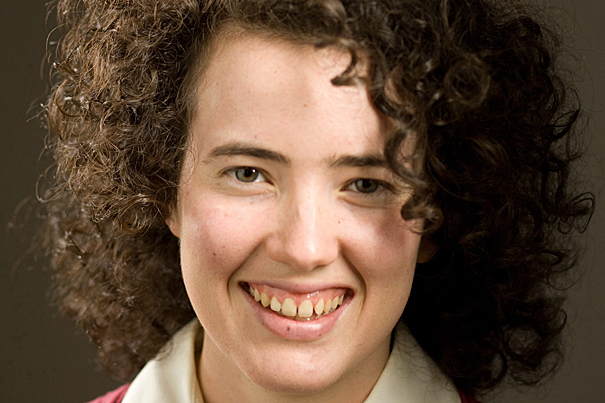
Diana Wise, Fay Prize winner
Radcliffe Institute awards Captain Jonathan Fay Prize to Diana C. Wise
Daniel Bear ’10 and Molly Siegel ’10 receive honorable mention
The Radcliffe Institute for Advanced Study at Harvard University has awarded its 2010 Captain Jonathan Fay Prize to Diana C. Wise, a Harvard senior concentrating in history and literature. Wise was selected for her thesis “Mere Trifles: Lord Hervey’s ‘Memoirs’ and the Significance of the Insignificant,” an incisive analysis of the writings, life, and sociopolitical environment of John, Lord Hervey, an 18th century English courtier of King George II and Queen Caroline. Radcliffe Institute Dean Barbara J. Grosz will present the Fay Prize at Radcliffe’s annual Strawberry Tea, today (May 19), from 3 to 5 p.m. in the Faculty Room at Harvard University Hall (attendance by invitation only). Harvard seniors Daniel Bear and Molly Siegel will receive honorable mention for their outstanding theses in molecular and cellular biology and history of science, respectively.
“The Radcliffe Institute is delighted to honor Diana Wise for her trenchant and thought-provoking analysis of Lord Hervey’s ‘Memoirs’ and the elegant prose with which she unveils the importance of the seemingly insignificant,” said Grosz, who is also Higgins Professor of Natural Sciences in Harvard’s School of Engineering and Applied Sciences. “This work, which is at once history, philosophy, and literature, is of publishable quality and makes us eager to see Wise’s future scholarly contributions.”
The Radcliffe Institute annually awards the Fay Prize to a graduating Harvard College senior who has produced the most outstanding imaginative work or original research in any field. Candidates for the Fay Prize are chosen from the winners of Harvard College’s Thomas T. Hoopes Prize for outstanding scholarly work or research. Winners of the Hoopes Prize, which is funded by the estate of Thomas T. Hoopes ’19, can be found at the Faculty of Arts and Sciences Office of the Secretary Web site.
Fay Prize winner
Wise’s thesis, lauded as a “stunning piece of work” by the 2010 Fay Prize selection committee, is a close analysis of trifles, as described in Lord Hervey’s 900-page “Memoirs” and as identified by Wise in the life of the author himself. After obtaining permission from the Royal Archives at Windsor Castle to examine the original manuscript of the “Memoirs,” Wise scrutinized Hervey’s observations of minutiae in the court of King George II and Queen Caroline against prevailing notions of the trivial in 18th century Britain. Her thesis renders Hervey’s seemingly pointless obsessions a revelatory window onto the man and his time, demonstrating how apparently inconsequential matters give rise to momentous events.
According to Wise’s adviser James Engell, “‘Mere Trifles’ evinces the work of a gifted young historian blessed with a literary style that carries with it sheer verbal pleasure but also a heightened sense of judgment, of mature interpretation concerning human motivation and its historical record.” Engell is Gurney Professor of English Literature and a professor of comparative literature in Harvard’s Faculty of Arts and Sciences.
Wise said, “By a splendid coincidence, I received the news [of the award] on the afternoon of my birthday, and it was the perfect birthday present: completely unexpected and an immense honor. Lord Hervey, I think, would be gratified.”
After graduating from the College on May 27, Wise, who also won a 2010 Bowdoin Prize for Undergraduate Essays in the English Language, plans to spend the summer traveling in China and Africa before beginning an M.Phil. program in medieval history at Cambridge University’s Trinity College (U.K.), supported by the Herchel Smith Harvard Postgraduate Scholarship.
Fay Prize honorable mentions
Bear received honorable mention for his thesis “Genome-wide and Single-cell Analysis of Neuronal Activity-regulated Gene Expression,” which also garnered him the 2010 Lawrence J. Henderson Prize. By homing in on cellular-level genetics, he discovered that the more activity there is in a neuron, the greater the changes in gene expression. The journals Nature and Neuron have published the results of this research, which he did as part of a team in the lab of Michael E. Greenberg, chair of the Neurobiology Department and Nathan Marsh Pusey Professor of Neurobiology at Harvard Medical School.
The Fay Prize selection committee noted, “Daniel’s work is significant because it shows that, in brain development, nature and nurture work in partnership; there is not a dichotomy between the two.”
After graduation, Bear will pursue a Ph.D. in neuroscience at Harvard.
Siegel earned honorable mention for her thesis “‘Beyond the Boundaries of My Brain’: Reinterpreting W.H.R. Rivers and the Psychological Trauma of World War I,” in which she reanalyzes the work of Rivers to produce a more nuanced and complete picture of the idealized psychiatrist and his treatment methods and positions on ethnography and the Great War. She reveals, for example, that Rivers neither opposed the war nor subscribed fully to Freudian treatments for shell shock. Siegel’s adviser was Elizabeth Yale, College Fellow in the Department of the History of Science.
The Fay Prize selection committee recognized Siegel for “a solidly researched and well-written reinterpretation of W.H.R. Rivers” and for “providing unique insights capable of transforming existing narratives.”
Following graduation, Siegel will conduct research at the Eating Disorders Research Unit at Columbia Medical Center in New York City.




